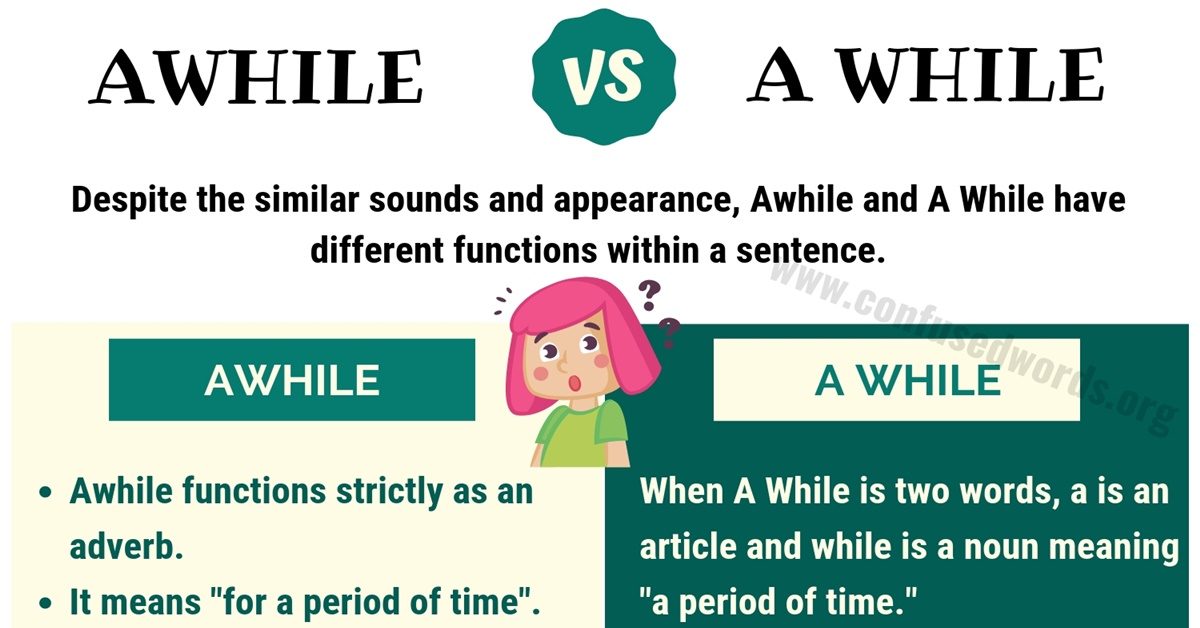

Awhile Vs A While: Understanding The Difference And Usage
Awhile vs A While can be a confusing topic for many English speakers and writers. Understanding the distinction between these two terms is crucial for clear and effective communication. In this article, we will delve into the nuances of "awhile" and "a while," exploring their definitions, uses, and common mistakes. By the end of this guide, you will have a firm grasp of when to use each term appropriately.
Both "awhile" and "a while" are commonly used in everyday English, but they serve different grammatical functions. "Awhile" is an adverb, while "a while" is a noun phrase. This subtle difference can lead to significant misunderstandings, particularly for non-native speakers. To ensure you are using these terms correctly, we will provide a detailed examination of their meanings, examples of proper usage, and tips to avoid common pitfalls.
In addition to clarifying the differences between "awhile" and "a while," this article will also provide insights into their origins and how they have evolved in the English language. We aim to empower you with the knowledge to enhance your writing skills and communicate more effectively. So, let’s dive into the world of "awhile" and "a while."
Table of Contents
- Definition of Awhile and A While
- Correct Usage of Awhile
- Correct Usage of A While
- Common Mistakes to Avoid
- Examples of Awhile and A While
- Etymology of Awhile and A While
- Tips for Remembering the Difference
- Conclusion
Definition of Awhile and A While
"Awhile" is an adverb that means "for a short time" or "for a while." It is often used to indicate a temporary duration of time. For example: "Please stay awhile." In contrast, "a while" is a noun phrase that refers to a period of time. It is usually preceded by a preposition such as "for" or "in." For example: "I haven't seen him in a while."
Differences in Grammar
The critical difference between "awhile" and "a while" lies in their grammatical function:
- Awhile: Adverb
- A While: Noun Phrase
Correct Usage of Awhile
When using "awhile," remember that it functions as an adverb. It should be used to modify verbs, indicating how long an action takes place.
- Example: "Let's sit here awhile and enjoy the view."
- Example: "She waited awhile before responding."
Correct Usage of A While
"A while" is typically used with prepositions to indicate a duration of time. It is important to note that "a while" is not used on its own to indicate time without a preposition.
- Example: "I will be back in a while."
- Example: "He has been working for a while."
Common Mistakes to Avoid
Many people confuse "awhile" and "a while," leading to common grammatical errors. Here are some tips to help you avoid these mistakes:
- Do not use "awhile" after prepositions. For example, "for awhile" is incorrect; it should be "for a while."
- Ensure that "a while" is used with a preposition, whereas "awhile" stands alone.
Examples of Awhile and A While
Here are some practical examples to illustrate the correct use of "awhile" and "a while":
- Awhile: "She decided to rest awhile before continuing her journey."
- A While: "It took a while to finish the project."
Etymology of Awhile and A While
Understanding the origins of "awhile" and "a while" can provide deeper insights into their usage. "Awhile" comes from the Old English word "hwila," meaning "time." Over time, it developed into the modern adverb form. On the other hand, "a while" combines the indefinite article "a" with "while," which has similar roots in Old English.
Tips for Remembering the Difference
To help you remember the difference between "awhile" and "a while," consider the following tips:
- Remember that "awhile" is an adverb, often relating to actions.
- Think of "a while" as a noun phrase that always needs a preposition.
Conclusion
In summary, understanding the difference between "awhile" and "a while" is essential for clear communication in English. "Awhile" serves as an adverb indicating a short duration of time, while "a while" is a noun phrase that refers to a period of time. By avoiding common mistakes and practicing proper usage, you can enhance your writing skills and ensure clarity in your communication.
We encourage you to leave a comment about your experiences with these terms and share this article with others who may benefit from this knowledge. Also, feel free to explore other articles on our site for more tips and insights on effective writing.
Thank you for reading, and we hope to see you again soon!
Coldplay: A Sky Full Of Stars - The Story Behind The Hit Song
Is FragranceNet Legit? A Comprehensive Review
My Spotify Room: Transforming Your Listening Experience


